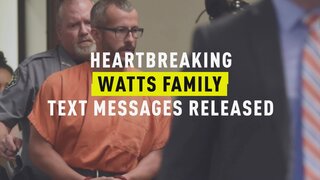Create a free profile to get unlimited access to exclusive videos, breaking news, sweepstakes, and more!
New Documentary Aims To Give Shanann Watts A Voice, Combat Victim-Blaming
“American Murder: The Family Next Door” filmmaker Jenny Popplewell says that female victims of violent crimes, like Shanann Watts, are often blamed for the actions of the perpetrators.
A new documentary on the Watts family murders aims to give a voice to Shanann Watts, the pregnant mom who lost her life to her husband and family annihilator Chris Watts.
In a now notorious case, Chris murdered his entire family in August 2018. He first strangled Shanann, who was 15 weeks pregnant with their son, inside their Frederick, Colorado home before smothering their young daughters, Bella, 4, and Celeste, 3. After disposing of their bodies at an oil drilling site where he worked, he attempted to play the role of a concerned husband and dad. But that facade soon crumbled: it became evident that he'd been having an affair and, after the bodies were discovered, he was arrested before ultimately pleading guilty to their murders; he was sentenced to life in prison without the possibility of parole.
Despite Chris' heinous crimes, however, some trained their focus on Shanann, scrutinizing her Facebook profile and criticizing her as an overbearing wife.
“This is something that happens to female victims of violent crime,” filmmaker Jenny Popplewell told Oxygen.com. “They are always shamed. They are always blamed for the actions of the perpetrator.”
Popplewell is the director behind “American Murder: The Family Next Door,” a documentary on the Watts family murders debuting Wednesday on Netflix.
The director sees a double standard in the way Chris has been treated following his confession: some have taken pity on him, to the point where he's even received fan mail and admiration from women, as he serves life behind bars.
“We try so hard in the media to find redeeming qualities in Chris and we don't have to look very hard before we start shaming Shanann and I think it’s something we need to address really quickly because it’s really detrimental to women,” the director told Oxygen.com.
Often, people online point to Shanann’s so-called “bossy” personality, which is referenced in the documentary.
"She could be bossy," Shanann's closest friend in Colorado, Nichole Atkinson, told investigators early on in the case. "But, in a good way."
Popplewell told Oxygen.com that she dislikes that term and notes that it's typically reserved for only women.
“She wasn’t a bossy wife,” Popplewell said. “She was the dominant personality in the relationship but he was a passive. He was completely docile.”
As the documentary shows, Shanann was flexible and introspective. The film includes texts in the days before the murders in which Shanann is critical of her own treatment of Chris as she struggles to fix their marriage. She is proactive and desperate while he continues to lie to her about his cheating.
“She’s self-deprecating,” Popplewell told Oxygen.com. “She knows her own flaws. She blames herself.”
“It’s just devastating how hard she tries,” she added.
The filmmaker described Shanann as a high achiever who bought a mansion at age 25 after a divorce. She was also a loving mother.
“She needs to be commended," she said.

Popplewell said Shanann’s family, with whom she worked closely for the documentary, is aware that people will continue to talk about this case.
“What they don’t like [...] is for people to look for clues as to why she may have brought this on herself,” she said.
Shanann’s family in North Carolina gave Popplewell access to Shanann’s laptop, drives and phone. Popplewell mined the files, images and video for key moments which she used to piece the story together in a way that requires no narrator. She said she'd like to leave a lot of interpretation up to the viewer, while pushing for Shanann’s genuine self to shine through.
“I’m not going to convince everybody that she wasn’t bossy and deserved it and those people will hopefully remain quiet online or talk about it amongst themselves,” she told Oxygen.com. “You’re not going to fix that but what I would like to do is highlight that we should change the way we talk about victims in the media and online and I'm hoping that’s something that Shanann's legacy can bring about.”




























